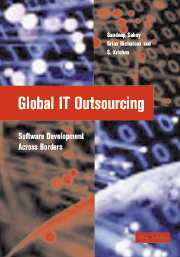Book contents
- Frontmatter
- Contents
- List of figures
- List of tables
- List of boxes
- Foreword
- Acknowledgements
- List of abbreviations
- 1 Introducing the phenomenon of global software work
- 2 Globalization and global software work
- 3 GlobTel's GSA programme in India
- 4 The GlobTel–Witech relationship: a ‘standardization’ perspective
- 5 Global software work: an identity perspective
- 6 The GlobTel–MCI relationship: the dialectics of space and place
- 7 Managing the knowledge transfer process: the case of Sierra and its Indian subsidiary
- 8 The case of Gowing and Eron GSA: power and control
- 9 Cross-cultural communication challenges: GSAs between Japanese and Indian firms
- 10 Reflections and synthesis on theoretical insights
- 11 Managerial implications
- Index
3 - GlobTel's GSA programme in India
Published online by Cambridge University Press: 14 January 2010
- Frontmatter
- Contents
- List of figures
- List of tables
- List of boxes
- Foreword
- Acknowledgements
- List of abbreviations
- 1 Introducing the phenomenon of global software work
- 2 Globalization and global software work
- 3 GlobTel's GSA programme in India
- 4 The GlobTel–Witech relationship: a ‘standardization’ perspective
- 5 Global software work: an identity perspective
- 6 The GlobTel–MCI relationship: the dialectics of space and place
- 7 Managing the knowledge transfer process: the case of Sierra and its Indian subsidiary
- 8 The case of Gowing and Eron GSA: power and control
- 9 Cross-cultural communication challenges: GSAs between Japanese and Indian firms
- 10 Reflections and synthesis on theoretical insights
- 11 Managerial implications
- Index
Summary
Introduction
In this chapter, we provide a broad overview of the initiation, expansion and stabilization of GlobTel's GSA programme in India that includes the four relationships with Witech, MCI, ComSoft and SKA (all pseudonyms). Two of these firms (MCI and Witech) were large and established Indian software houses, while ComSoft was a start-up company established by Indian technocrats with Silicon Valley roots, and SKA was a software firm established by a medium-sized business house with limited experience in software development. MCI was based in Mumbai, SKA in Delhi and the other two in Bangalore. The relation with SKA was short-lived owing to perceived business incompatibilities with GlobTel, and after two years Softsys replaced SKA as the fourth partner.
The overview of GlobTel's programme is based broadly on the interviews taken with senior managers of GlobTel in North America, their expatriate managers in India and with senior members of the staff in one of their labs in the UK. Background information has also been obtained from the company Website and newsletters. The overview is at a macro level, encompassing the four relationships, and not restricted to any particular GSA. The overview is at a rather ‘factual’ level of details of key events in the relationship, including a historical reconstruction of events prior to 1996 when our research started, and then an account of key events as the research progressed from 1996 to 2000. This overview provides the backdrop for chapters 4–6, where three of the individual cases are theoretically analysed.
- Type
- Chapter
- Information
- Global IT OutsourcingSoftware Development across Borders, pp. 51 - 63Publisher: Cambridge University PressPrint publication year: 2003

